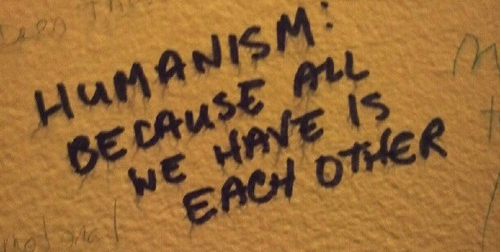Happy World Humanist Day: A few reflections about Humanism, community, and the future of nonreligion.
Today is the summer solstice. For most people, that just means it’s the longest day of the year and the half-way point of summer. But Humanists have been trying for the last few decades to make something more meaningful of the occasion.
World Humanist Day has been taken as an opportunity to spread and celebrate Humanist ideals. Last year, Chris shared how he came to discover Humanism, but my story isn’t nearly so interesting. I came into undergrad not knowing what Humanism was, then I met the recently-formed Yale Humanist Society at the student activities bazaar and got involved.
Since then, I’ve expressed some frustration about “Humanism” as a label. I didn’t think it was a clear or philosophically substantive position, and ended up believing that we’re better turning towards more conventional forms of moral philosophy to ground our values. 1 I’m starting to become convinced, though, that this fuzziness might actually provide us something extremely important. Chris quoted this definition of Humanism last year:
You won’t ever get a group of nonbelievers to agree on a particular brand of moral philosophy, but you can get just about all of them to agree to something like this. I remember discovering that definition my freshman year of college and being thoroughly enamored by it—it expressed exactly how I wanted to live my life, even if I didn’t have the philosophical background I do now to go deeper.
One thing atheists need to think more about, I think, is what type of world they want to make and live in. What will the average life of a nonbeliever look? How will they relate to religion? What will their community life involve?
We’re getting a lot less religious as a country, 2 so what, if anything, will Americans turn to? Scandinavian countries, I think, can give us an idea. They’re remarkably irreligious, 3 and some recent and fantastic sociological research, primarily by Phil Zuckerman, has explored their beliefs and lives. The Times writes on the topic:
The many nonbelievers [Zuckerman] interviewed, both informally and in structured, taped and transcribed sessions, were anything but antireligious, for example. They typically balked at the label “atheist.” An overwhelming majority had in fact been baptized, and many had been confirmed or married in church.
Though they denied most of the traditional teachings of Christianity, they called themselves Christians, and most were content to remain in the Danish National Church or the Church of Sweden, the traditional national branches of Lutheranism.
At the same time, they were “often disinclined or hesitant to talk with me about religion,” Mr. Zuckerman reported, “and even once they agreed to do so, they usually had very little to say on the matter.”
I think most atheists would laugh at the idea that the future of secularism in American lies in what’s essentially a form of nominal Christianity, but it’s not so outlandish. 4 My only concern is that our culture is much less homogenized than our Scandinavian counterparts, which is why I think Humanism has so much promise.
Humanism is great exactly because it’s not a really substantive philosophical or intellectual position. 5 And that’s fine. Few Christians actively think about the Ten Commandments when acting, just like few atheists think about maximizing utility (and I rarely think about universalizing my maxims. 6 Instead, most people seem to follow a more organic moral decision-making process, usually involving consulting their conscience, their friends, and so on. All we really need, I think, is a socially supportive group to say “hey, we’re here for you and care about you being a good person.”
Thats the promise of Humanism, I think—it’s just vague, fuzzy, and feel-goody enough to match the Danish National Church in sustaining a broad community that’s supportive, positive, and human. Humanism can be something people from any cultural background, be it Jewish, Muslim, or Christian, can reach to as their beliefs soften.
Otherwise, we may very well end up looking more like the Scandinavian nations, at least in terms of our attitude towards religion and religious identities. Maybe Humanism will never catch on, and future secular Americans will simply stay within the nominal identity of whatever religious traditions they were raised in. They’ll celebrate Christmas without Christ, go to Church without praying to anyone, and shy away from the word “atheist” altogether.
Personally, I’ll probably always celebrate Christmas, and my kids will celebrate Christmas. I don’t expect any secular Christian churches to pop up any time soon, though. So in the mean time, however the future of American religion looks, Humanism can do some real good and provide some real community to nonbelievers. That, at least, makes me proud to say I’m a Humanist.
 Vlad Chituc is a lab manager and research assistant in a social neuroscience lab at Duke University. As an undergraduate at Yale, he was the president of the campus branch of the Secular Student Alliance, where he tried to be smarter about religion and drink PBR, only occasionally at the same time. He cares about morality and thinks philosophy is important. He is also someone that you can follow on twitter.
Vlad Chituc is a lab manager and research assistant in a social neuroscience lab at Duke University. As an undergraduate at Yale, he was the president of the campus branch of the Secular Student Alliance, where he tried to be smarter about religion and drink PBR, only occasionally at the same time. He cares about morality and thinks philosophy is important. He is also someone that you can follow on twitter.
Notes:
Feel free to read my ongoing series on morality to get more of my thoughts about how atheists ought to go about answering moral questions. ↩Though, it’s worth noting, belief in God has barely risen at all in the last ten years. Religion is softening, not going away. ↩About 1/3 of Danes believe in neither a God nor a universal spirit, which is basically unheard of in any other geographical region. ↩I actually have a lot of trouble imagining New Atheism as anything but a somewhat marginal and reactionary position. I’d be amazed to see it gain broader cultural relevance. ↩I’m basically just trying to piss off New Atheists and Humanists at the same time right now. ↩I’m a bad neo-kantian ↩



